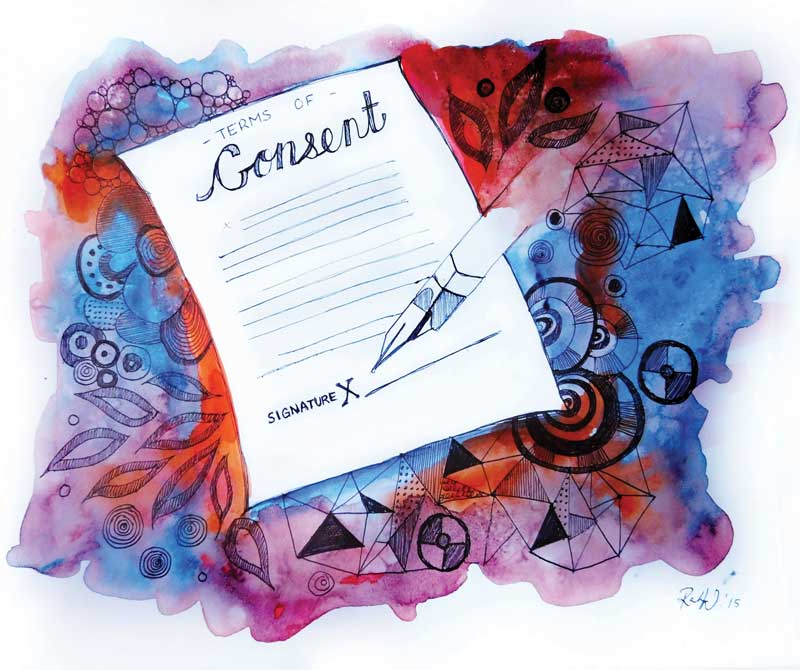
Consent, vital in any relationship, is closely tied to power dynamics and the way they play out in both sexual and non-sexual relationships. Consent plays out differently in queer relationships than in heterosexual ones, due to both distinct power dynamics and a less rigid social perception of the roles in the relationship. Learning about consent in the queer community is illuminating for both queer and non-queer people; yet, a lot of discussions around consent seem to be missing this perspective.
“One of the reasons why it’s really essential to talk about queer experiences is to recognize how power dynamics play out differently,” Cameron Butler, the Macdonald Community Wellbeing Coordinator at McGill Student Housing and Hospitality Services, told me in an interview. Butler develops anti-oppression, consent, and mental health programming for the Macdonald campus, and works on the Consent McGill campaigns.
“When it comes to heterosexual relationships, it can often be, at least along gender lines, relatively simplified to a man and a woman. And so, instantly, it’s easier to identify where those dynamics are happening or what the power situation is,” Butler said.
In queer relationships, however, power dynamics vary depending on the people involved, and interactions between them will often replicate social power relations; if there are assumed or perceived masculine and feminine gender roles in the relationship, those power dynamics may reappear. However, power dynamics still exist separately from gender norms – for example, someone who is cis could have more power in a relationship than someone who is trans. The perceived difference in power can manifest itself overtly, perhaps in feelings of fear, or more subtly, in a desire to please the more privileged partner in the relationship.
While power dynamics still exist within queer relationships, the lack of queer visibility in popular culture makes it possible to approach consent in queer sexual encounters with fewer preconceptions. One queer McGill student, who wished to remain anonymous, told me that “because of the lack of representation for queer relationships within the media, there isn’t so much of a narrative or a script for what a queer relationship is supposed to look like. So it’s easier to fit consent into [the relationship], because there’s not an established structure that prevents it.”
Another queer student echoed this sentiment, saying, “There does exist abusive tendencies and the same problems in any sexual relationship in the queer community. But I think the fact that we’re not conditioned [by society] for the sex that we’ll be having [gives queer sex] more of an exploratory nature, and we ask more for [consent] every step of the way.”
Many individuals in queer communities are marginalized because of their sexual identities and preferences, as well as other societal factors, making it all the more important to address the power dynamics in a relationship. One way to do so is for the privileged partner to take a more active role in order to ensure the comfort and safety of the marginalized individual, first and foremost by making it clear that consent is never assumed or expected.
Butler also spoke to the importance of carefully navigating consent with survivors of sexual assault. “I think there are often a lot more people in the queer community [in comparison to non-queer people] who have experienced sexual assault or sexual violence,” said Butler. “There is much more need to negotiate consent with someone who has experienced sexual violence and that means [...] you must be much more thoughtful to ensure the comfort of each other.”
Reflecting on my own experiences with consent, I notice that with men, consent is assumed a lot more than with women. I will be nervous and especially careful when asking for consent from women, but with men, I will assume consent for kissing, and only ask if more is involved. It is important to unlearn this problematic behaviour, as it takes a lot of sexual autonomy away from men and perpetuates the patriarchal expectation of high male sexual desire and dominance.
By ignoring the varied manifestations of consensual interactions, consent campaigns can give off “this simplified idea that men are sexual predators and women are survivors,” Butler said. “It erases the experiences of men who are survivors of sexual assault or prevents us from recognizing that even when you have six partners in queer relationships, consent is still a thing that matters.”
Butler said that, this fall’s Consent McGill campaign made an effort to include queer and other narratives. “When it comes to broader messaging, [Consent McGill is] base-level and applies to everyone, but when it comes to the events and different discussions, we’re able to go into much more nuance.”

